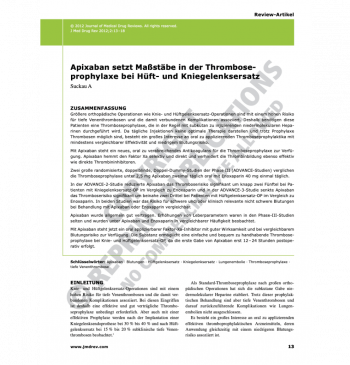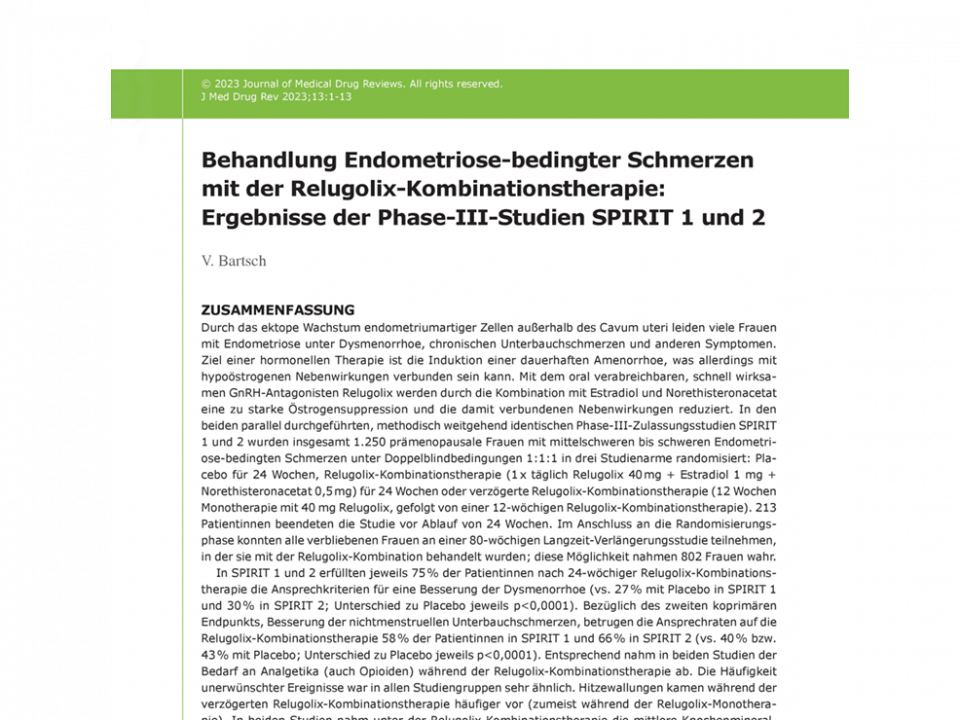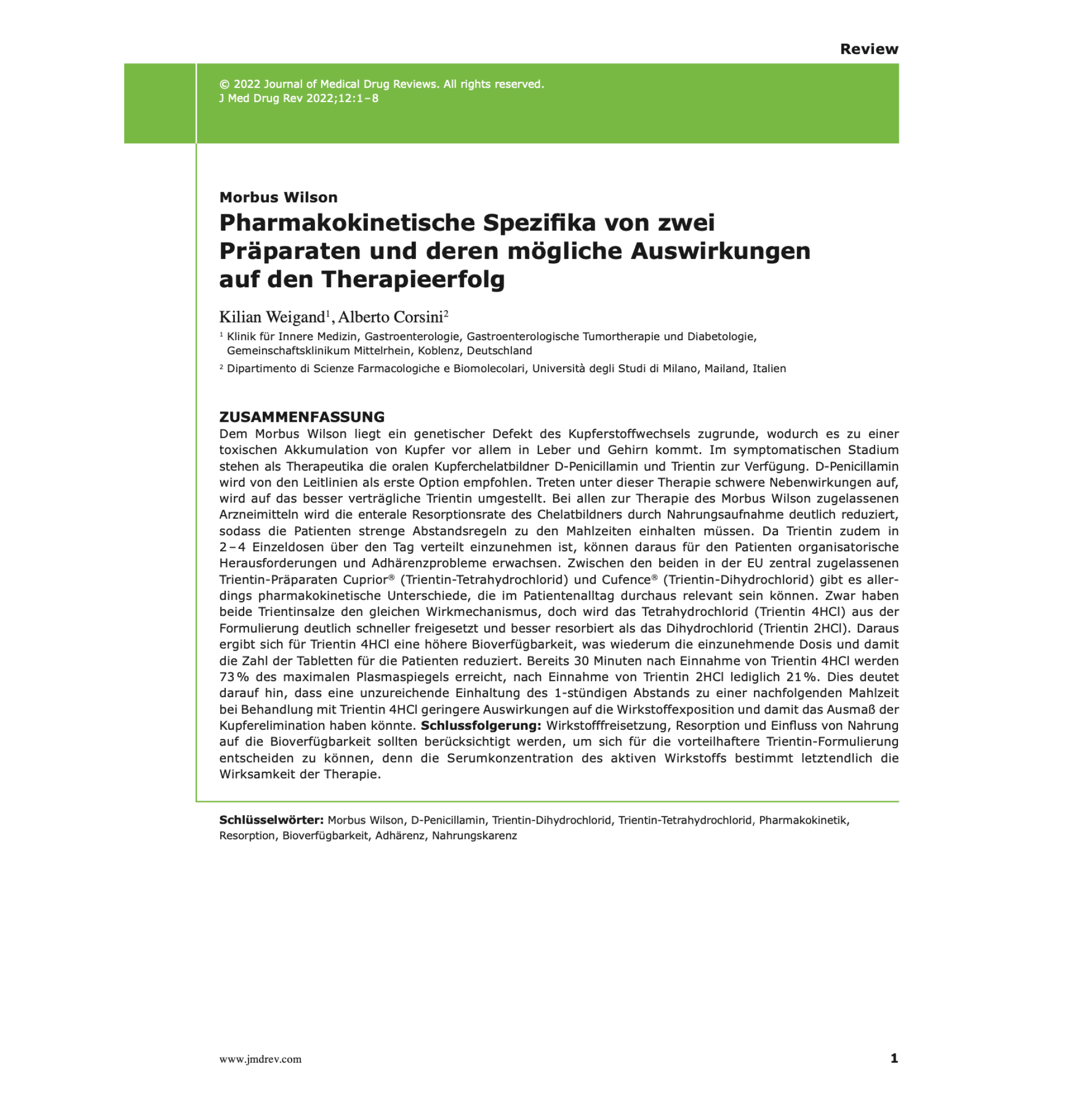Apixaban sets benchmarks for thromboprophylaxis in cases of hip and knee replacement
J Med Drug Rev 2012;2;13-18
(Review-Artikel in deutscher Sprache)
Major orthopedic surgical procedures such as knee or hip replacement surgeries are associated with a high risk of deep venous thrombosis (DVT) and related complications. Therefore, these patients need thromboprophylactic treatments being performed in most cases with subcutaneously injected low molecular weight heparins (LMWH). Since daily injections cannot be regarded as an optimal therapeutic approach and DVT is observed despite this prophylaxis, there is a great interest in oral agents for thromboprophylaxis with at least comparable efficacy and low bleeding risk.
Apixaban is a new, orally administered anticoagulant for thromboprophylaxis. Apixaban inhibits factor Xa selectively and directly and inhibits thrombin formation as effectively as direct thrombin inhibitors.
Two major randomized, double-blind, double-dummy phase III studies (ADVANCE studies) compared thromboprophylactic treatment with 2.5 mg apixaban bid orally to 40mg enoxaparin uid.
In ADVANCE-2, apixaban reduced the risk of thrombosis in patients with knee replacement surgery significantly by two fifths compared to enoxaparin and in ADVANCE-3, apixaban reduced thrombosis risk in patient with hip replacement significantly by nearly two thirds compared to enoxaparin. In both studies, the risk for major and/or clinically relevant minor bleedings was comparable with apixaban and enoxaparin.
Apixaban was generally well tolerated. Increases of lever enzymes rarely occurred in both phase III studies and were observed with apixaban and enoxaparin in comparable frequencies.
Apixaban, an orally administered factor Xa inhibitor, shows good efficacy and a bleeding risk comparable to enoxaparin. The substance allows easy and comfortable management of thromboprophylaxis after knee and hip replacement surgery, since the first dose of apixaban must be administered only 12-24 hours postoperatively.
(Review-Artikel in deutscher Sprache)
Major orthopedic surgical procedures such as knee or hip replacement surgeries are associated with a high risk of deep venous thrombosis (DVT) and related complications. Therefore, these patients need thromboprophylactic treatments being performed in most cases with subcutaneously injected low molecular weight heparins (LMWH). Since daily injections cannot be regarded as an optimal therapeutic approach and DVT is observed despite this prophylaxis, there is a great interest in oral agents for thromboprophylaxis with at least comparable efficacy and low bleeding risk.
Apixaban is a new, orally administered anticoagulant for thromboprophylaxis. Apixaban inhibits factor Xa selectively and directly and inhibits thrombin formation as effectively as direct thrombin inhibitors.
Two major randomized, double-blind, double-dummy phase III studies (ADVANCE studies) compared thromboprophylactic treatment with 2.5 mg apixaban bid orally to 40mg enoxaparin uid.
In ADVANCE-2, apixaban reduced the risk of thrombosis in patients with knee replacement surgery significantly by two fifths compared to enoxaparin and in ADVANCE-3, apixaban reduced thrombosis risk in patient with hip replacement significantly by nearly two thirds compared to enoxaparin. In both studies, the risk for major and/or clinically relevant minor bleedings was comparable with apixaban and enoxaparin.
Apixaban was generally well tolerated. Increases of lever enzymes rarely occurred in both phase III studies and were observed with apixaban and enoxaparin in comparable frequencies.
Apixaban, an orally administered factor Xa inhibitor, shows good efficacy and a bleeding risk comparable to enoxaparin. The substance allows easy and comfortable management of thromboprophylaxis after knee and hip replacement surgery, since the first dose of apixaban must be administered only 12-24 hours postoperatively.




